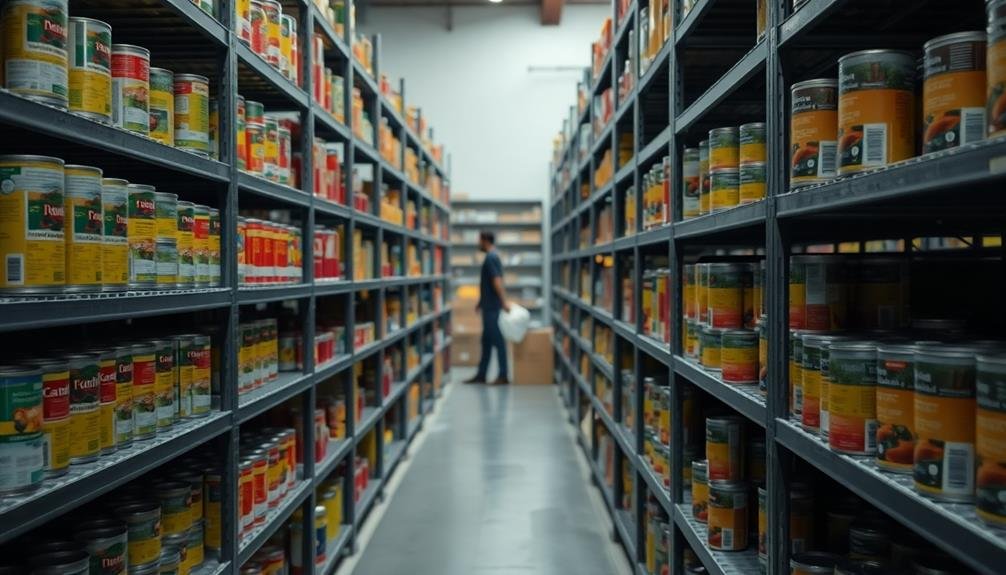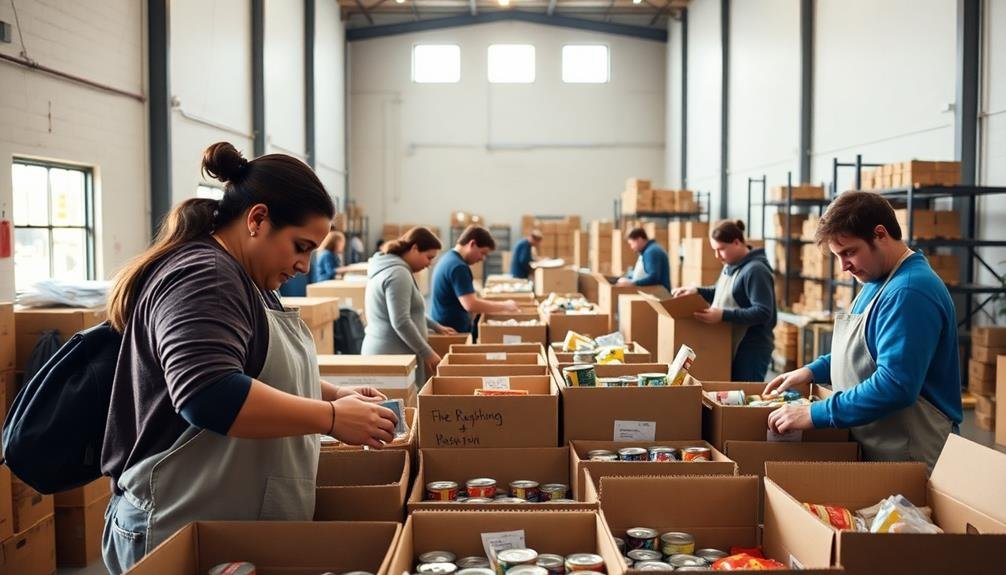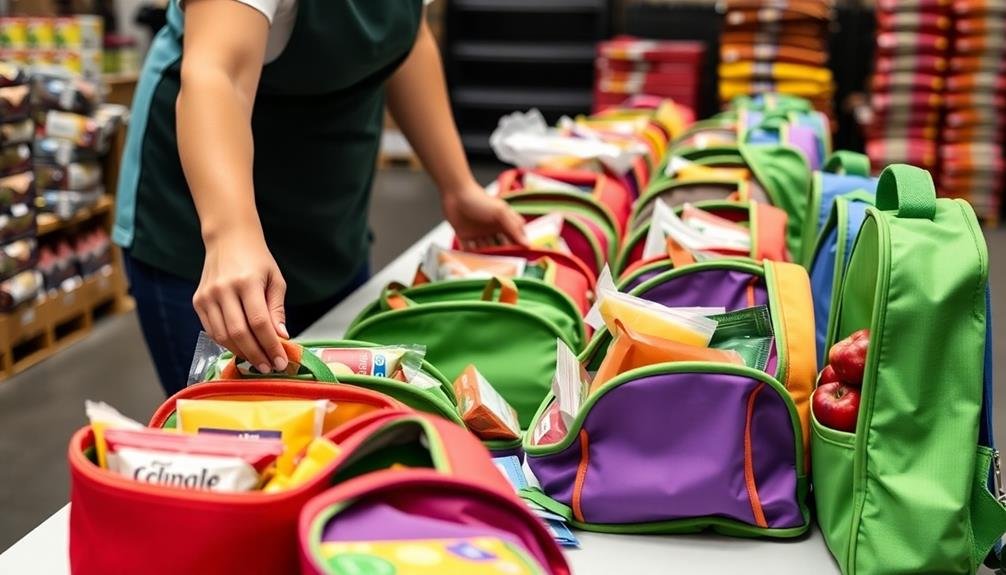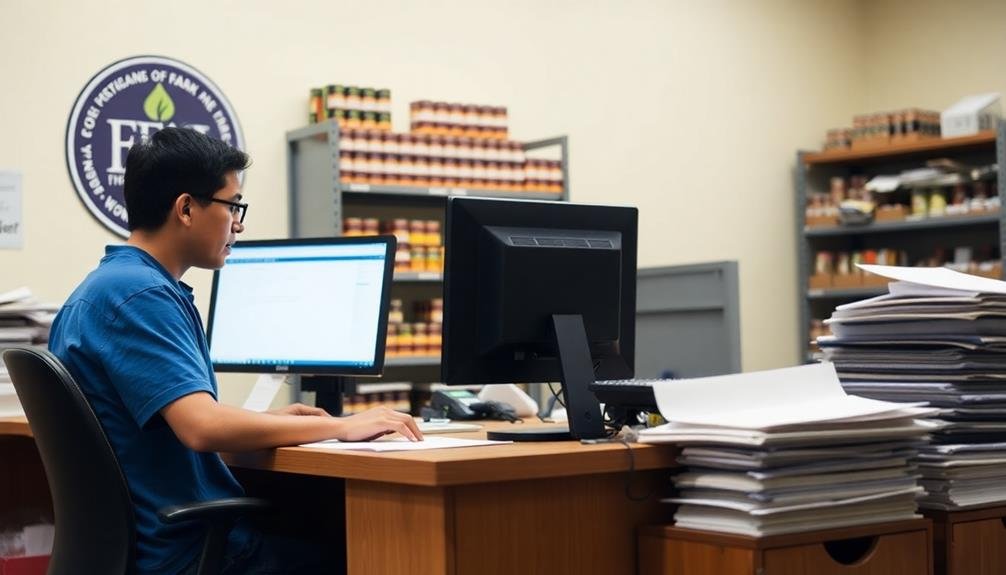If you're an introvert looking to make a difference at your local food bank, there are plenty of tasks suited to your preferences. You can sort canned goods, organize produce, assemble food boxes, or restock shelves. For those who enjoy data work, inventory management and record keeping are great options. Quality control inspection allows you to work independently while ensuring food safety. Packing backpacks for kids or preparing meal kits offers structured, low-interaction volunteering. These tasks let you contribute meaningfully without overwhelming social interaction. By focusing on behind-the-scenes work, you'll play a significant role in your community's food security efforts. There's more to explore in each of these rewarding volunteer opportunities.
Sorting Canned Goods

At the heart of food bank operations, sorting canned goods is an ideal task for introverted volunteers. You'll find yourself working independently, organizing various canned items by type, expiration date, and nutritional value. This task requires focus and attention to detail, allowing you to immerse yourself in the work without the need for constant social interaction.
As you sort, you'll be responsible for checking expiration dates and verifying the cans aren't damaged or compromised. You'll create neat stacks or fill boxes with similar items, making it easier for food bank staff to distribute them efficiently. This process helps streamline the food bank's operations and guarantees that recipients receive a balanced variety of nutritious options.
While sorting, you might occasionally interact with other volunteers or staff members, but these interactions are typically brief and task-oriented. You'll have the satisfaction of knowing your efforts directly contribute to feeding those in need within your community.
The quiet, methodical nature of this task allows you to make a significant impact while working at your own pace in a low-pressure environment.
Organizing Produce
In keeping with the theme of solitary tasks, organizing produce offers another excellent opportunity for introverted volunteers at food banks. You'll work independently to sort, inspect, and arrange fresh fruits and vegetables. This role requires attention to detail and a methodical approach, which many introverts excel at.
When organizing produce, you'll need to:
- Carefully examine each item for signs of spoilage or damage
- Sort produce by type and ripeness
- Package items for easy distribution to food bank clients
Your efforts guarantee that families receive high-quality, nutritious produce. You'll remove any bruised or overripe items, preventing waste and maintaining food safety standards.
As you work, you'll develop a system for efficient sorting and packaging, allowing you to process large quantities of fruits and vegetables quickly.
This task also gives you the chance to work at your own pace without the pressure of constant social interaction. You'll contribute considerably to the food bank's mission while enjoying a quiet, focused environment.
Assembling Food Boxes

Assembling food boxes at a food bank offers introverts a chance to hone valuable skills.
You'll learn efficient packing techniques to maximize space and guarantee items are secure during transport.
As you focus on nutrition-balanced box assembly, you'll also develop inventory management skills, tracking stock levels and expiration dates.
Efficient Packing Techniques
Efficiently packing food boxes is an essential skill for food bank volunteers. As an introvert, you'll appreciate the methodical nature of this task. Start by organizing your workspace, guaranteeing all items are within reach. Arrange boxes in a line for easy filling, and group similar food items together.
When packing, follow these key principles:
- Distribute weight evenly: Place heavier items at the bottom and lighter ones on top.
- Maximize space: Fit smaller items into gaps between larger ones.
- Protect fragile items: Wrap glass jars or delicate produce in paper or bubble wrap.
Use a checklist to guarantee each box contains a balanced variety of foods.
As you work, you'll develop a rhythm that allows you to pack quickly and accurately. Don't be afraid to ask for guidance on proper packing techniques or food safety guidelines.
Nutrition-Focused Box Assembly
While efficient packing is important, creating nutritionally balanced food boxes takes your volunteer efforts to the next level. As an introverted volunteer, you'll find this task both rewarding and suitable for your preferences. You'll focus on assembling boxes that provide recipients with a well-rounded selection of foods to meet their nutritional needs.
Start by familiarizing yourself with the food bank's nutrition guidelines. These often include recommendations for protein, grains, fruits, and vegetables. As you assemble boxes, aim to include items from each food group. You'll need to pay attention to expiration dates and guarantee a mix of shelf-stable and fresh items when available.
Here's a simple guide to help you create balanced food boxes:
| Food Group | Examples | Suggested Quantity |
|---|---|---|
| Protein | Canned tuna, beans | 2-3 items |
| Grains | Rice, pasta, cereal | 2-3 items |
| Fruits | Canned peaches, dried raisins | 1-2 items |
Remember to include recipe cards or meal ideas that incorporate the boxed items. This thoughtful addition can help recipients make the most of their food assistance. By focusing on nutrition, you're not just filling boxes; you're providing families with the foundation for healthy meals.
Inventory Management Skills
A food bank's inventory management is essential for effective box assembly. As an introverted volunteer, you'll find this task perfectly suited to your strengths. You'll work independently, focusing on organizing and tracking food items without the need for constant social interaction.
Your role in inventory management will involve:
- Cataloging incoming donations
- Monitoring expiration dates
- Updating digital inventory systems
You'll need to pay close attention to detail, guaranteeing accurate records of food quantities and types. This task requires concentration and precision, allowing you to work methodically in a quiet environment.
You'll use your organizational skills to arrange items efficiently, making it easier for other volunteers to locate and distribute food. By managing inventory, you'll contribute greatly to the food bank's operations.
Your work will help prevent waste, guarantee food safety, and streamline the box assembly process. You'll also gain valuable skills in data management and logistics, which can be applicable in various professional settings.
Don't worry about extensive social interaction; your primary focus will be on the inventory itself. You'll communicate mainly through written reports and occasional brief updates to supervisors.
This role allows you to make a meaningful impact while working in a way that suits your introverted nature.
Restocking Shelves
Restocking shelves offers introverted volunteers a peaceful way to contribute at food banks. You'll find this task allows you to work independently while still making a significant impact. As you handle various food items, you'll develop a keen understanding of the organization's inventory and how it's managed.
When restocking, you'll typically start by checking expiration dates and ensuring older items are placed at the front. This rotation system helps minimize food waste. You'll learn to organize products by category, making it easier for clients to find what they need. Pay attention to weight distribution, placing heavier items on lower shelves for safety.
You might also be responsible for breaking down cardboard boxes and disposing of them properly. This task helps maintain a clean and organized environment. As you work, you'll likely develop a rhythm that allows you to complete the job efficiently.
Restocking shelves can be a meditative experience, giving you time to reflect while contributing to your community. It's an excellent opportunity to make a difference without the pressure of constant social interaction.
Inventory Management

Building on the skills learned from restocking, inventory management offers introverted volunteers a deeper exploration into the operational side of food banks. You'll work independently to track incoming and outgoing food items, guaranteeing accurate records are maintained. This role requires attention to detail and organizational skills, making it ideal for introverts who thrive in structured environments.
As an inventory management volunteer, you'll be responsible for:
- Counting and recording stock levels
- Updating digital inventory systems
- Identifying items nearing expiration dates
You'll use specialized software to input data, generate reports, and analyze trends in food distribution. This task allows you to contribute greatly to the food bank's efficiency without extensive social interaction.
You'll help optimize storage space, reduce waste, and guarantee that food is distributed before it expires. Your work in inventory management directly impacts the food bank's ability to serve the community effectively.
Labeling Donations
Precision plays an essential role in the labeling of donations at food banks. As an introverted volunteer, you'll find this task both rewarding and suited to your preferences. You'll work independently, focusing on accurately categorizing and marking items for easy identification and distribution.
Your responsibilities will include inspecting donated goods, determining their contents, and applying appropriate labels. You'll need to pay close attention to details like expiration dates, allergen information, and nutritional content. This task requires concentration and accuracy, making it ideal for those who prefer quiet, methodical work.
Here's a breakdown of common labeling categories:
| Category | Examples | Labeling Considerations |
|---|---|---|
| Canned Goods | Soups, vegetables | Expiration date, low sodium |
| Dry Goods | Pasta, rice | Gluten-free, whole grain |
| Hygiene Items | Soap, toothpaste | Non-food item, fragrance-free |
Packing Backpacks for Kids

You'll find assembling nutritious meal kits for kids' backpacks a fulfilling task that aligns well with introverted tendencies.
You can organize supplies efficiently, ensuring each backpack contains a balanced selection of food items.
This role allows you to work independently and quietly, focusing on the important task of helping children in need without social pressure.
Assembling Nutritious Meal Kits
For introverts seeking a meaningful way to contribute, assembling nutritious meal kits for kids is an ideal task. This activity allows you to work independently while making a significant impact on children's lives.
You'll be responsible for putting together balanced meals that provide essential nutrients to those in need.
The process typically involves:
- Sorting non-perishable food items into categories
- Following specific guidelines to create balanced meal combinations
- Packaging the items neatly in containers or bags
As you work, you'll focus on creating meals that are both nutritious and appealing to children. This might include assembling kits with items like whole grain cereals, canned fruits and vegetables, protein-rich foods, and healthy snacks.
You'll need to pay attention to expiration dates and guarantee that each kit meets the required nutritional standards.
Organizing Supplies Efficiently
Efficiency is key when organizing supplies for backpack programs. You'll find this task well-suited to your introverted nature, as it requires focus and attention to detail.
Start by sorting donated items into categories like non-perishable foods, school supplies, and hygiene products. Create a system that allows for quick identification and easy access to each item.
Set up designated areas for different stages of the packing process. You'll want separate spaces for unpacking donations, sorting items, assembling backpacks, and storing completed packs. Use shelving units or labeled bins to keep everything tidy and accessible.
Develop a checklist of items that should go into each backpack, ensuring consistency across all packs. As you work, keep track of inventory levels and alert supervisors when supplies run low. This proactive approach helps maintain a smooth operation.
Consider implementing a color-coding system for different age groups or dietary needs. This visual aid can streamline the packing process and reduce errors.
Working Independently and Quietly
Once the supplies are organized, it's time to start packing backpacks for kids in need. This task is perfect for introverted volunteers who prefer working independently and quietly.
You'll find a secluded corner of the food bank where you can focus on filling each backpack with nutritious, easy-to-prepare meals and snacks. As you work, you'll follow a specific packing list to guarantee each child receives a balanced assortment of food items.
You'll methodically place each item in the backpack, making sure it's secure and won't get damaged during transport. This repetitive task allows you to work at your own pace without the pressure of constant interaction.
Here are three reasons why packing backpacks is ideal for introverts:
- Minimal social interaction required
- Ability to work at your own pace
- Sense of accomplishment from completing tangible tasks
You'll appreciate the quiet atmosphere as you work, knowing that your efforts are directly helping children in your community. This task allows you to make a significant impact without stepping too far out of your comfort zone, making it an excellent choice for introverted volunteers at the food bank.
Quality Control Inspection
While many tasks at food banks involve direct interaction, quality control inspection offers a perfect opportunity for introverted volunteers to contribute quietly yet considerably.
You'll work independently, examining donated food items for safety and quality. This role requires attention to detail and a keen eye for spotting potential issues.
Your responsibilities will include checking expiration dates, inspecting packaging for damage, and ensuring food items meet the bank's standards.
You'll sort through donations, separating items that are safe to distribute from those that aren't. This task is essential in maintaining the food bank's reputation and ensuring the health of recipients.
You'll need to familiarize yourself with food safety guidelines and the organization's specific protocols.
While you may occasionally need to consult with staff, most of your work will be solitary. You'll use your judgment to make decisions about food items, which can be empowering for introverts who prefer autonomous work.
Data Entry and Record Keeping

For those who prefer working behind the scenes, data entry and record keeping offer an ideal opportunity to contribute to a food bank's operations.
You'll play an essential role in maintaining accurate records of donations, inventory, and distribution. This task requires attention to detail and a methodical approach, making it perfect for introverts who thrive in quiet, focused environments.
As a data entry volunteer, you'll typically work with specialized software to input information from various sources. You might be responsible for:
- Logging incoming donations, including quantities, types of food, and donor information
- Updating inventory records to reflect current stock levels and expiration dates
- Recording outgoing distributions to partner organizations and families in need
Your work will help the food bank track its impact, identify trends, and make informed decisions about resource allocation.
You'll also assist in generating reports for stakeholders and funding organizations. While this role may not involve direct interaction with clients, your efforts will greatly contribute to the food bank's efficiency and effectiveness.
Meal Kit Preparation
You'll find meal kit preparation an ideal task for introverts at food banks.
This assembly line-style work allows you to focus quietly on portioning and packaging ingredients efficiently.
You'll appreciate the structured, low-interaction environment where you can contribute meaningfully without the pressure of extensive social engagement.
Assembly Line Efficiency
Precision is key when it comes to assembly line efficiency in meal kit preparation. As an introverted volunteer, you'll find comfort in the structured nature of this task. You'll work alongside others, but minimal interaction is required as you focus on your specific role in the assembly process.
To maximize efficiency, follow these steps:
- Familiarize yourself with the meal kit components and their proper placement.
- Maintain a consistent pace to keep the line moving smoothly.
- Pay attention to quality control, ensuring each kit is complete and correctly assembled.
Your attention to detail will shine as you carefully place ingredients into containers or bags. You'll develop a rhythm, methodically adding items in the correct order and amounts.
This repetitive task allows you to work independently while contributing to the team's overall goal.
Quiet, Focused Work
The quiet, focused work of meal kit preparation offers introverted volunteers a perfect opportunity to contribute without social pressure.
You'll find yourself in a calm environment, assembling pre-portioned ingredients for nutritious meals. This task requires attention to detail and precision, allowing you to immerse yourself in the work without the need for constant interaction.
As you prepare meal kits, you'll follow specific recipes and guidelines. You'll measure and package dry goods, add canned items, and include any necessary cooking instructions. Your role is essential in ensuring families receive well-balanced, easy-to-prepare meals.
The repetitive nature of the task can be soothing, allowing you to enter a flow state and work efficiently.
This type of volunteer work also provides a sense of accomplishment. You can see the tangible results of your efforts as completed meal kits stack up.
It's a great way to make a meaningful impact while working independently. If you're an introvert who thrives in quiet, structured environments, meal kit preparation at a food bank could be an ideal volunteer opportunity for you.
Frequently Asked Questions
How Do I Sign up to Volunteer at a Food Bank?
To sign up as a food bank volunteer, you'll need to contact your local food bank directly. Visit their website or call them to inquire about volunteer opportunities. They'll guide you through their application process and available positions.
What Should I Wear When Volunteering at a Food Bank?
You'll want to wear comfortable, closed-toe shoes and casual clothes you don't mind getting dirty. Opt for layers, as temperatures can vary. Avoid loose jewelry or clothing that could get caught in equipment. Check if they have specific requirements.
Are There Age Restrictions for Food Bank Volunteers?
Age restrictions for food bank volunteers vary. You'll often find opportunities for teens and adults, but some tasks may have minimum age requirements. It's best to check with your local food bank for their specific policies on volunteer age limits.
Can I Volunteer With a Group or Organization at the Food Bank?
Yes, you can volunteer with a group or organization at the food bank. Many food banks welcome group volunteers, including corporate teams, schools, and community organizations. Contact your local food bank to inquire about group volunteering opportunities and scheduling.
How Often Can I Volunteer at the Food Bank?
You can volunteer at the food bank as often as you'd like. Most food banks welcome regular volunteers. You'll find options for weekly, monthly, or occasional shifts. Check with your local food bank for their specific scheduling policies and needs.
In Summary
You've discovered a variety of ways to make a difference at your local food bank, even if you're an introvert. These tasks allow you to work independently while still contributing to an essential cause. Whether you're sorting donations, assembling packages, or managing inventory, you're playing an important role in fighting hunger. Don't let shyness hold you back—reach out to your nearest food bank and find a volunteer opportunity that suits your personality and skills.





Leave a Reply